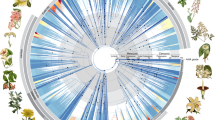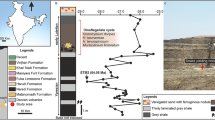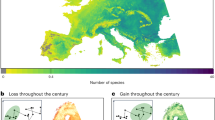Abstract
MY young friend Mr. Allan Caplan has recently obtained a remarkable series of fossil plants in the Miocene shales at Creede, Colorado. Among these the conifers are especially interesting, and one specimen consists of a small cone, about 19 mm. long, broadly oval in form, the scales armed with long prickles (Fig. 1). I sought the advice of my colleague, Dr. Edna L. Johnson, who at once produced some immature cones of Pinus aristata, Engelmann, the foxtail pine of the western mountains of the United States. On comparison, it was impossible to see any difference. Knowlton (1923) described a Pinus crossii from Creede, based on foliage which does not appear to differ from that of P. aristata.
This is a preview of subscription content, access via your institution
Access options
Subscribe to this journal
Receive 51 print issues and online access
$199.00 per year
only $3.90 per issue
Buy this article
- Purchase on Springer Link
- Instant access to full article PDF
Prices may be subject to local taxes which are calculated during checkout
Similar content being viewed by others
References
Carnegie Inst. Publ., 416.
Author information
Authors and Affiliations
Rights and permissions
About this article
Cite this article
COCKERELL, T. An Ancient Foxtail Pine. Nature 133, 573–574 (1934). https://doi.org/10.1038/133573c0
Issue Date:
DOI: https://doi.org/10.1038/133573c0
Comments
By submitting a comment you agree to abide by our Terms and Community Guidelines. If you find something abusive or that does not comply with our terms or guidelines please flag it as inappropriate.



